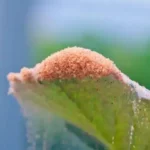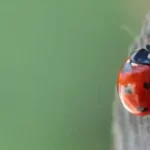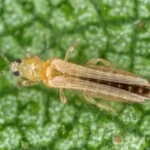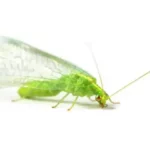If you’ve ever battled with pesky flea beetles ravaging your garden, you’re not alone. The frustration of seeing your hard work destroyed can be disheartening. But don’t worry, I’m here to help because, believe it or not, your morning coffee could be the solution to your flea beetle problem. Let’s explore how using coffee grounds for flea beetles can turn the tables on these garden invaders.
Coffee grounds can help keep flea beetles away from the garden due to their strong scent, a natural repellent. Sprinkling coffee grounds around plants can create a barrier that deters flea beetles from feeding on them. Additionally, coffee grounds can improve soil health, which may indirectly help plants resist pests like flea beetles.
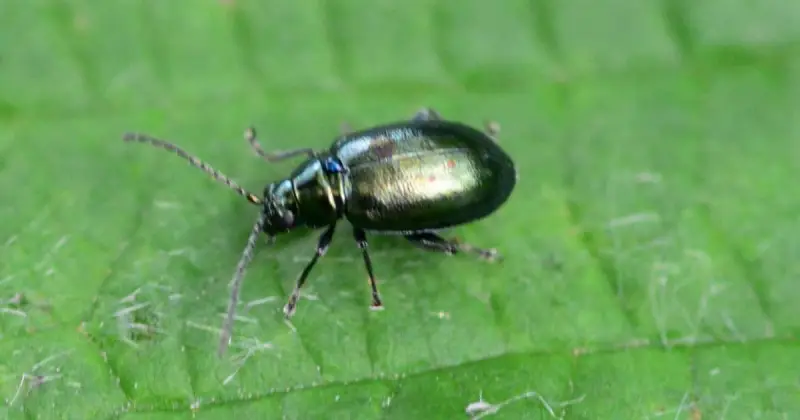
Read on to uncover the secrets of using coffee grounds as a natural deterrent for flea beetles and how this eco-friendly gardening hack can significantly safeguard your garden. Prepare to bid farewell to those troublesome flea beetles and enjoy a flourishing garden again.
Humble Highlights
- Discover these 4 insider secrets and keep damaging flea beetles away from your plants so you can boost your garden’s defenses while being environmentally friendly!
- Save money and promote sustainability by using coffee grounds to control flea beetles and why you MUST disrupt their life cycle so you can achieve better pest management to decrease their population.
- Save time by selecting these cost-effective flea beetle pest control alternatives so you can naturally repel these beetles AND discover why trap crops and crop rotation are vital in managing swelling beetle colonies.
Identifying Flea Beetles
When identifying flea beetles, note their small size, ranging from 1/16 to 1/8 inch, with shades of black, bronze, bluish, brown, or metallic gray, along with their distinctive large hind legs used for jumping.
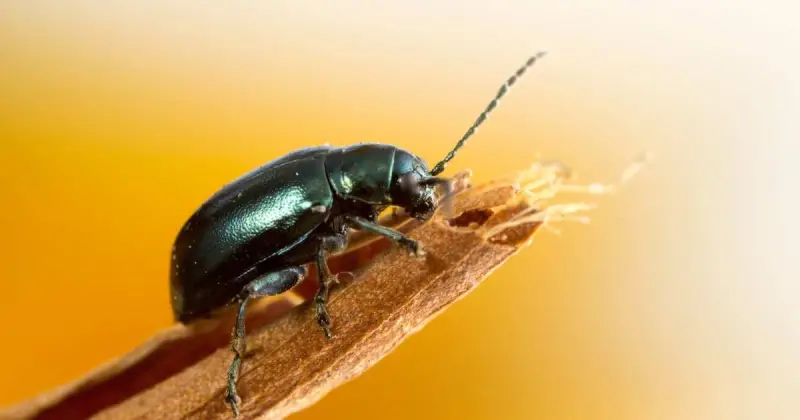
These pests are notorious for their voracious appetite for plant leaves, causing significant damage that can hinder plant growth and, if left unchecked, devastate your food oasis. 1
To control flea beetle populations effectively, implement integrated pest management strategies involving cultural and mechanical controls to help minimize minimize beetle access to susceptible plants.
- Row Covers: Covering plants with floating row covers can prevent flea beetles from reaching them and laying eggs, effectively protecting them from damage.
- Crop Rotation: Rotating crops each season can help disrupt the life cycle of flea beetles, reducing their numbers in the garden.
- Natural Predators: Introducing natural predators of flea beetles, such as ladybugs, lacewings, or parasitic wasps, can help keep their populations in check.
- Botanical Insecticides: derived from neem or pyrethrum can assist in managing flea beetle infestations while protecting plant health.
Mulching is another popular method that can help prevent flea beetles in the garden in several ways.
First, a thick layer of mulch can act as a physical barrier, making it difficult for flea beetles to access the soil where they lay their eggs.
Second, organic mulches, such as straw or compost, can improve soil health and promote vigorous plant growth, making plants more resistant to flea beetle damage.
Finally, some types of mulch, such as diatomaceous earth, can be abrasive to flea beetles, deterring them from feeding on plants.
Life Cycle Of Flea Beetles
Flea beetles deposit eggs in the soil close to host plants throughout their life cycle. The larvae emerge from these eggs and consume plant roots, causing catastrophic harm. Here is a brief overview of the flea beetle life cycle:
- Eggs are laid in the soil near host plants.
- Larvae feed on plant roots and pupate in the soil.
- Adults emerge in mid-spring to mid-summer, primarily feeding on leaves.
- Adult flea beetles overwinter in leaf litter or at field margins.
Understanding the life cycle of flea beetles is crucial for effective pest management. Disrupting their life cycle can decrease their population and reduce damage to your plants.
Of course, one promising method for controlling flea beetles is using coffee grounds. Incorporating coffee grounds into the soil near host plants can help deter flea beetles and interfere with their life cycle. Consider integrating this natural solution into your pest management approach to safeguard your plants from these harmful pests. 2
Whether you are a novice or a seasoned backyard grower, sprinkling coffee grounds around new and established plants or incorporating grounds within the first few inches of garden soil is an effective deterrent. Watch the video below to see how easy, effective, and environmentally friendly this simple tip is!
Damage Caused By Flea Beetles
Understanding the impact of flea beetles on plants involves recognizing the specific damage they cause to various vegetation, especially vegetables and ornamental plants. Flea beetles target a variety of choice vegetables, including eggplant, cabbage, lettuce, and potatoes. Ornamental plants like catnip are also vulnerable to their carnage.
These beetles create small round holes on plant leaves, disrupting photosynthesis and overall plant health. Additionally, the larvae of flea beetles can harm plant roots, resulting in stunted growth or plant death. Plants within the Brassicaceae and Solanaceae families, which encompass many familiar vegetables and ornamentals, are particularly at risk of flea beetle damage. 3
Understanding this damage is crucial for effective pest control strategies, where innovative methods such as using coffee grounds can help manage flea beetle populations and safeguard plant health.
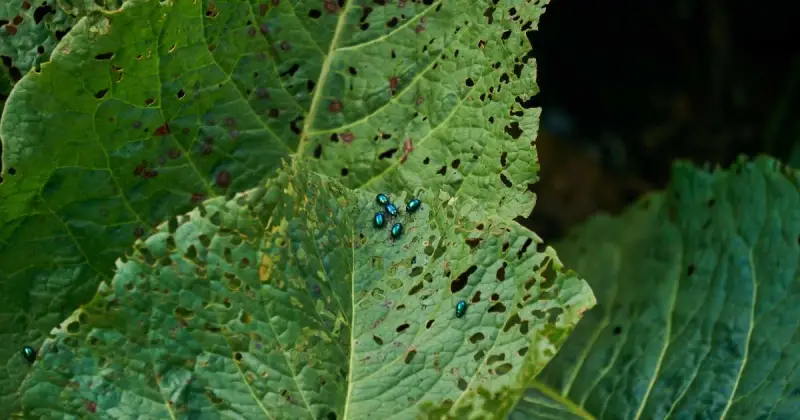
Alternative Flea Beetle Pest Control Methods
When dealing with flea beetle infestations, coffee grounds can be an effective and environmentally friendly approach to protecting plants. They can act as a natural repellent, providing a cost-efficient and sustainable solution.
Here are several practical tips for using coffee grounds to deter flea beetles:
- Spread coffee grounds around plant bases to create a barrier that flea beetles avoid. Interestingly, coffee grounds can improve soil health, which may indirectly help plants resist pests like flea beetles. 4
- Incorporate used coffee grounds into plant holes or mix them with soil to effectively repel flea beetles.
- Use coffee grounds preventively in your gardening routine to enhance plant defense.
- Employing coffee grounds for flea beetle management controls infestations and reduces reliance on harmful pesticides, promoting eco-friendly practices.
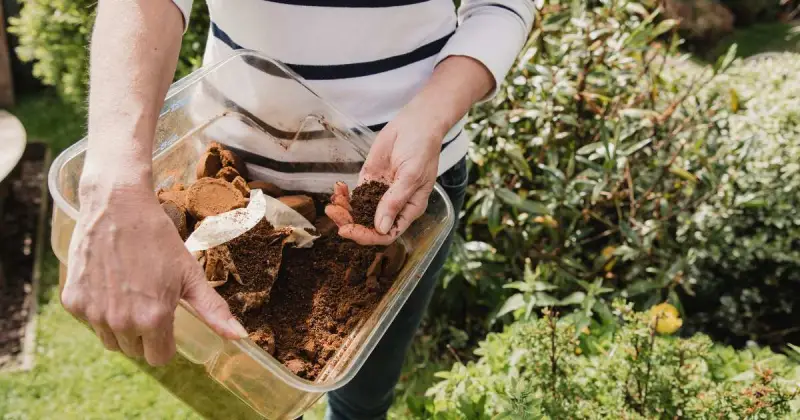
Planting Strategies And Companion Planting
Implementing strategic planting techniques and companion plants can play a crucial role in natural pest management when addressing ways to combat flea beetle infestations effectively. By utilizing innovative planting strategies, you can manage flea beetle infestations without harming beneficial insects or resorting to toxic chemicals.
Companion planting throughout your garden with species like radishes and nasturtiums can serve as natural deterrents against harmful flea beetles, reducing the reliance on synthetic chemical interventions. Mixing aromatic herbs such as basil and mint can confuse and repel flea beetles, effectively safeguarding target plants. 5
Incorporating trap crops, strategically sowed plants that help lure pests away from main crops and protect them from damage, can redirect flea beetles away from main crops, minimizing damage without harmful pesticides. Mustard greens help trap pesky flea beetles in your garden. Physical barriers like row covers create a protective shield, preventing flea beetles from reaching vulnerable plants.
Another excellent planting strategy for combating flea beetles is crop rotation. This common backyard and farming practice involves growing different crops in the same area in sequential seasons to improve soil health, reduce pests and diseases, and optimize yields. Crop rotation also disrupts the life cycle of flea beetles, ultimately decreasing their population in the garden.
Conclusion
Using coffee grounds to combat flea beetles in your garden is an innovative, practical, and effective solution. These pesky pests can wreak havoc on your plants, eating their roots and potentially causing irrefutable harm to your budding season.
Fortunately, there are options and strategies you can implement to help you stay ahead of flea beetle infestations. Coffee grounds can protect your garden and encourage a healthy ecosystem. And by embracing this natural and eco-friendly method, you can reclaim your food forest and help keep your plants safe.
Do you spread coffee grounds throughout your garden to help ward off flea beetles? We’d love to know if you do and how you keep your plant babies safe. Drop us a line in the comments below, and let us know what successfully works for you!
SOURCES
- Wikipedia – Flea Beetle
- Oxford Academic Journal Of Economic Entomology – Flea Beetle (Coleoptera: Chrysomelidae) Populations, Effects Of Feeding Injury, And Efficacy Of Insecticide Treatments On Eggplant And Cabbage In Southwest Virginia
- University Of Wisconsin-Madison, Extension – Flea Beetles
- Colorado State University, Extension – Flea Beetles
- Utah State University, Extension – Flea Beetles On Vegetables

